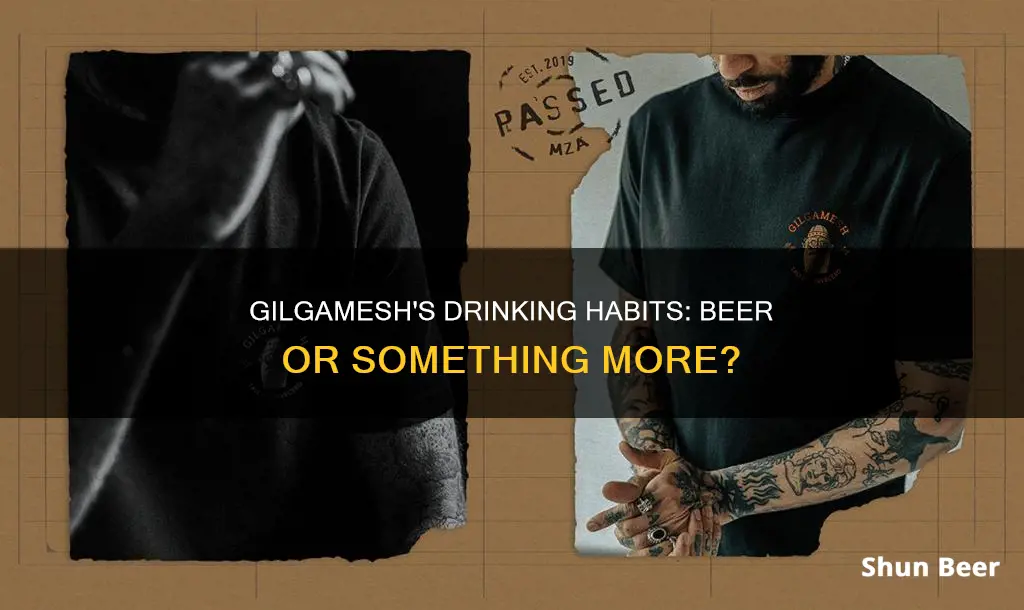
The Epic of Gilgamesh is one of the oldest surviving epics, and in it, beer is mentioned in a peculiar context. In the story, goddess Aruru creates a 'wild man' named Enkidu to confront Gilgamesh. Shamhat, a sacred temple prostitute, seduces Enkidu and civilizes him by making him eat bread and drink beer—symbols of civilization unknown to wild men. Beer is also mentioned again when the goddess Siduri advises Gilgamesh to abandon his quest for the meaning of life and instead savour the small wonders of life, like beer.
| Characteristics | Values |
|---|---|
| Drinking beer in the morning | Beer was a staple for Mesopotamians and was drunk all day, every day |
| Beer strength | 'Day' beer was probably around 0.5-1.5% ABV |
| Beer as a currency | Beer was used as currency in Ancient Mesopotamia |
| Beer as payment | Beer was used to pay daily workers, including the builders of the Giza pyramids |
| Beer in the Epic of Gilgamesh | Beer is mentioned in the Epic of Gilgamesh in the context of Enkidu being civilised by Shamhat, who makes him eat bread and drink beer |
| Beer goddess | The Sumerians had a separate beer goddess, Ninkasi |
What You'll Learn

Beer is mentioned in the Epic of Gilgamesh
Beer is indeed mentioned in the Epic of Gilgamesh, one of the oldest surviving epics. In the epic, the goddess Aruru creates a 'wild man' named Enkidu to confront Gilgamesh. However, Shamhat, a sacred temple prostitute, seduces Enkidu and civilises him by making him eat bread and drink beer—symbols of civilisation unknown to wild men. After drinking seven jugs of beer, Enkidu becomes "expansive and sang with joy". His face glowed, and he "splashed his shaggy body with water, and rubbed himself with oil, and turned into a human".
The Epic of Gilgamesh also mentions beer in another context. The goddess Siduri advises Gilgamesh to abandon his quest for the meaning of life and instead savour the small wonders of life, such as beer. Siduri is considered the first written mention of an 'alewife', a female brewer, bartender, or tavern keeper.
The inclusion of beer in the Epic of Gilgamesh reflects the significance of this beverage in ancient Mesopotamia. Beer was a staple drink for Mesopotamians, who consumed it throughout the day. It was also used as a form of currency, with daily workers being paid in beer. The Sumerians, widely regarded as the first civilisation in human history, had a separate beer goddess, Ninkasi.
The Radtke family, founders of the Oregon-based Gilgamesh Brewing, named their company after the Epic of Gilgamesh, citing it as an early source for beer brewing and consumption.
Beer at Work: Is It Allowed in Europe?
You may want to see also

Beer was a staple for Mesopotamians
Beer was a staple in the Mesopotamian diet and a favourite drink from prehistoric times. It was the most popular drink for men, women, and children alike. In fact, to be a Mesopotamian was to drink beer. Beer was considered to have healing and uplifting elements that could advance one's life.
The Sumerians, Akkadians, and Babylonians, the ancient inhabitants of modern-day Iraq, considered beer a daily staple and an essential component of social life. It was a beloved beverage, celebrated in poetry and song. Beer was also known to produce unwanted physical effects, like a certain less-than-stellar feeling the morning after or an inability to perform sexually. Still, Mesopotamians continued to drink their beer with enjoyment and gusto.
Banquets were a key part of the social calendar in Mesopotamia, and beer was an essential element. But people also drank beer at home, on the job, in the tavern, and in the temple—pretty much everywhere. Beer was also offered to the gods and goddesses and to the dead during drink rituals.
The varieties of beer were endless, brewed to different strengths and with different flavours. Although beer was cautiously filtered, it was drunk through a straw, which the Sumerians invented to keep from consuming residue in the beer. The straws were typically crafted from a hollow reed or, for the fancier set, bronze or gold.
The most detailed account of the brewing process appears in the 'Hymn to Ninkasi', goddess of beer. Ninkasi made fresh beer every day, using the best ingredients. Her priestesses sang a hymn to her as they worked, which doubled as a praise song and instructions for how to brew beer.
In the Epic of Gilgamesh, the wild man Enkidu "did not know how to eat bread nor had he ever learned to drink beer!" suggesting that drinking beer was seen as a "quality" of a civilised person.
Beer Drinking Champions: Who Consumes the Most?
You may want to see also

Beer was used as currency in Ancient Mesopotamia
The consumption of beer is a significant aspect of the story of Gilgamesh, a legendary Sumerian king of Uruk and the protagonist of the "Epic of Gilgamesh", an epic poem considered one of the earliest known works of literary fiction. In the poem, Gilgamesh's transition from nomadic life to civilisation is represented when he drinks beer. Beer symbolises the orderly lifestyle of hunter-gatherers in prehistoric times. The poem describes how "he drank the beer, and became expansive and sang with joy, and turned into a human".
Beer was also a significant part of daily life in ancient Mesopotamia, where it was considered a gift from the gods and a sign of wealth. The ancient Sumerians believed that beer was a magical brew that endowed the drinker with health, peace of mind, and happiness. They even had a goddess of beer named Ninkasi. The Babylonians, who also revered beer as a divine drink, took this reverence a step further by decreeing a daily beer ration to citizens in the Code of Hammurabi, their ancient set of laws. Citizens' daily beer rations depended on their wealth.
Beer was so valued in ancient Mesopotamia that it was sometimes used as a form of currency. In fact, the earliest written documents found in Mesopotamia, dating back to around 3400 BCE, are small clay tablets featuring the symbol for beer—a clay vessel with diagonal linear markings drawn inside it—as one of the most common words. Archaeologists have also discovered a 5,000-year-old clay tablet from the ancient city of Uruk (located in modern-day Iraq) that denotes the amount of beer rations paid to a worker, indicating that beer was used as a form of remuneration in ancient Mesopotamia. This discovery suggests that the concept of worker and employer was familiar to Mesopotamian society even before the development of currency.
The use of beer as currency in ancient Mesopotamia is further supported by the fact that bread and beer were considered "edible money". Grain was the basis of the national diet, and the consumption of bread and beer was seen as a hallmark of civilisation, distinguishing the Mesopotamians from "savages". Beer was also used medicinally and was often safer to drink than water, as the boiling process killed harmful microorganisms.
Green Beer: Cheers to Good Health and Fun!
You may want to see also

The Radtke family's brewery is named after Gilgamesh
The Radtke family's brewery, Gilgamesh Brewing, is named after the ancient Epic of Gilgamesh, which is often cited as an early source of beer brewing and consumption. The family, made up of Lee Radtke and his three sons, Mike, Nick, and Matt, has a long history of home brewing, and they eventually turned their hobby into a successful business.
The Epic of Gilgamesh, one of the oldest surviving epics, mentions beer in a unique and fascinating context. In the story, the wild man Enkidu is created by the goddess Aruru to confront Gilgamesh. However, Shamhat, a sacred temple prostitute, seduces Enkidu and introduces him to the ways of civilisation by making him eat bread and drink beer, which were unknown to him.
> "Eat the food, Enkidu, it is the way one lives. Drink the beer, as is the custom of the land," Shamhat told Enkidu.
Enkidu ends up drinking seven jugs of beer, becoming joyful and elated, and even singing. This transformation symbolises his transition from a wild man to a civilised human.
The Radtke family's choice to name their brewery after Gilgamesh is a fitting tribute to this ancient epic, which showcases the integral role of beer in the process of civilisation. Beer, in the context of the Epic of Gilgamesh, represents community, joy, and the taming of wild instincts.
Furthermore, the Radtke family's deep roots in Oregon, dating back to the 1970s, align with the story of Gilgamesh, which is set in ancient Mesopotamia, an area known for its rich brewing history. The Sumerians, considered the first civilisation in human history, were based in Mesopotamia and were renowned for their love of beer.
The Radtke family's passion for brewing and their strong connection to their Oregon community echo the themes of civilisation, community, and joy found in the ancient Epic of Gilgamesh. By naming their brewery after this epic, the Radtkes honour the ancient tradition of beer brewing and its role in bringing people together.
Drinking Beer on a Boat: Florida's Laws
You may want to see also

Beer is mentioned in relation to the character Enkidu
In the Epic of Gilgamesh, beer is mentioned in relation to the character Enkidu. Enkidu is a 'wild man' created by the goddess Aruru to confront Gilgamesh. Shamhat, a sacred temple prostitute, is tasked with seducing and civilizing Enkidu. She achieves this by offering him bread and beer, which he consumes in large quantities. Enkidu drinks seven jugs of beer, becoming "expansive and [singing] with joy".
The consumption of bread and beer is presented as a symbol of civilization, unknown to Enkidu in his wild state. Shamhat instructs him to " [e]at the food, Enkidu, it is the way one lives. Drink the beer, as is the custom of the land." After consuming the bread and beer, Enkidu undergoes a transformation, splashing his body with water, rubbing himself with oil, and donning clothing. He takes up a weapon and begins to protect the shepherds by chasing away lions and wolves.
The inclusion of beer in this scene suggests that it was viewed as an important aspect of Mesopotamian culture and daily life. Beer is also mentioned elsewhere in the Epic of Gilgamesh, where the goddess Siduri advises Gilgamesh to abandon his quest for the meaning of life and instead find joy in simple pleasures, such as beer.
Drinking Beer in Public: Canadian Laws and Regulations
You may want to see also
Frequently asked questions
Yes, in the Epic of Gilgamesh, Enkidu teaches Gilgamesh how to drink beer.
The Epic of Gilgamesh is one of the oldest surviving epics, dating back to the 18th century BCE.
Enkidu is a 'wild man' created by the goddess Aruru to confront Gilgamesh. Shamhat, a sacred temple prostitute, seduces Enkidu and civilizes him by making him eat bread and drink beer.
Beer is mentioned in the Epic of Gilgamesh as a symbol of civilization, unknown to wild men. Additionally, the goddess Siduri advises Gilgamesh to abolish his quest for the meaning of life and instead enjoy the small wonders of life, like beer.
Yes, the inclusion of beer in the Epic of Gilgamesh is notable as it is believed to be one of the earliest sources for beer brewing and use.







